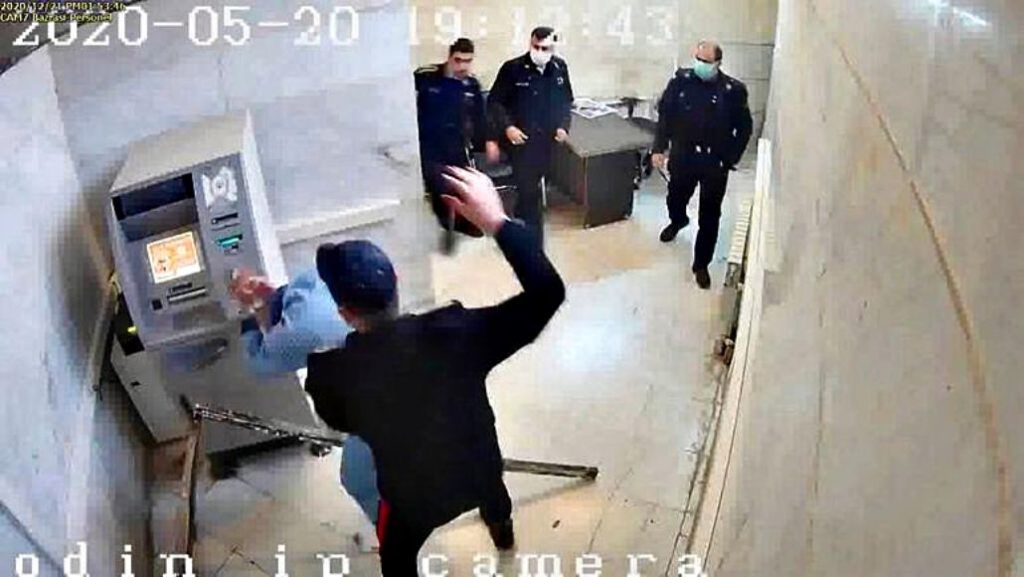By Kayhan Life Staff
An open letter by 19 political prisoners in cellblock 8 inside Tehran’s Evin Prison has warned Iranian President Ebrahim Raisi, the head of the Judiciary Gholamhossein Ejei, and the Commander of the Islamic Revolutionary Guards Corps Major General Hossein Salami, against the continued and systematic use of “white torture” against prisoners.
Many dissidents (including journalists) who have been held in Evin Prison have experienced so-called “white torture,” which reportedly includes solitary confinement, sleep deprivation, and subjection to constant and repetitive sounds and bright lights. Many inmates are often kept in detention centers outside the control of the prison authorities, including Section 209 of Evin Prison.
Citing the case of Mehdi Darini, who set himself on fire in October, the signatories to the Oct. 31 letter argued that “chronic disregard for prisoners’ rightful demands” had morphed into “white torture” and become detrimental to the mental health of inmates.
After the authorities ignored his petitions, letters, and complaints, Mr. Darini, a political prisoner serving a five-year sentence, set himself on fire on Oct. 28 in cellblock 8 in Evin prison.
Two inmates and correctional officers rushed to Darini’s help and put the fire out. He suffered superficial burns to his face, neck, and body and was transferred to Evin Prison’s infirmary.
“The chronic disregard of authorities for prisoners’ rightful demands has been detrimental to their mental health and resulted in white torture with devastating effects,” the letter said. “While quick intervention by prison guards and two inmates who witnessed the self-immolation saved his [Darini’s] life, the incident could have been a catastrophe for the prison and a national calamity. The guards and the two inmates suffered minor injuries.”
“It is not surprising that such an incident should occur, given that security agents constantly humiliate and abuse prisoners, and intelligence and judiciary officials systematically violate defendants’ rights,” the letter argued. “We can expect more protests if the prosecutor’s representative in prison continues to impose conditions, or if the chief of the Judiciary criticizes the unchecked power of the security apparatus but does nothing to curb the authority of interrogators who control furloughs, or when the Prison Organization’s guidelines are arbitrarily implemented and not carried out under the supervision of security agencies.”
“Unfortunately, three days ago, a few security officials and a notorious deputy prison director threatened to put [Darini] in solitary confinement and transfer him to a different prison instead of addressing his rightful demands,” the letter noted.
“We, the signatories to this letter, are inmates in Evin Prison’s cell block 8,” the letter explained. “We warn the head of the executive branch, whose influence extends to the Ministry of Intelligence; the Commander of the IRGC, who controls the force’s Intelligence Organization; and the Judiciary chief, who oversees the operations of the prosecutor’s office, courts, judges, and prisons, that they can expect stronger actions by prisoners if the situation does not improve.”
“They will see consequential reactions by prisoners if security agencies continue to control courts and prisons, and if political prisoners are housed with other inmates, if their convictions are not reviewed, and if they are not retried in open and competent courts,” the letter added.
Human Rights Should Be Core Focus of Iran Nuclear Talks, Says Activist Mohammadi
Iran’s Inhumane Treatment of Prisoners Is Now Systematic, Human Rights Expert Says
New Database Tracks Iran’s Human Rights Violations Since 1979
Bektash Abtin, one of the signatories to the letter, is a poet, documentary filmmaker, and member of the Iranian Writers’ Associations (IWA) who has been serving a six-year sentence since 2019 on charges of “propaganda against the state” and “actions against national security.”
In September, PEN America awarded Bektash Abtin and two other imprisoned writers — Keyvan Bajan and Reza Khandan Mahabadi — its PEN/Barbery Freedom to Write Award.
PEN America is a U.S.-based non-profit organization “that works to defend and celebrate free expression in the United States and worldwide through the advancement of literature and human rights.”
Other signatories to the letter included Seyyed Afkham Ebrahimi, Peyman Pourdad, Moin Hajizadeh, Hamid Haj-Jafar Kashani, Mojtaba Khosravi-Babadi, Mehran Rauf, Sajjad Shokri, Khosrow Sadeghi-Boroujeni, Gholamreza Safari, Kayvan Samimi, Sadegh Abbasi, Mahmoud Alinaghi, Abolfazl Ghasali, Sirus Gharcheh, Hossein Keyhani, Mehdi Mohammadi, Amirhossein Mir-Khalili and Mojtaba Nayeri.
EXCLUSIVE – U.N. Expert Backs Probe into Iran’s 1988 Killings, Raisi’s Role
SPECIAL REPORT- Iran’s Leader Ordered Crackdown on Unrest: “Do Whatever It Takes to End It”


